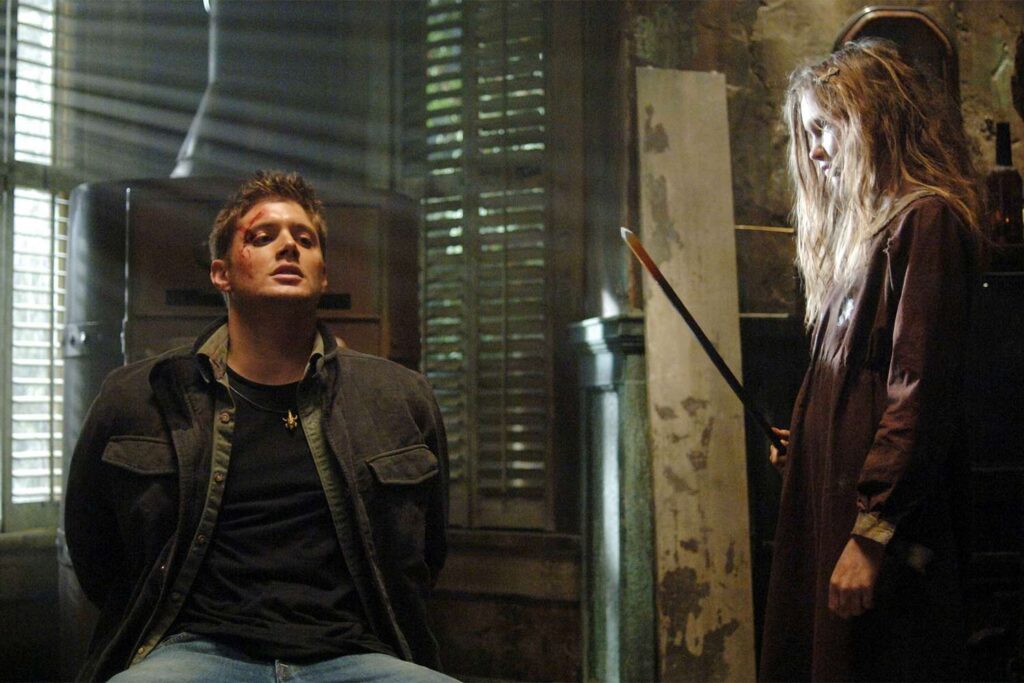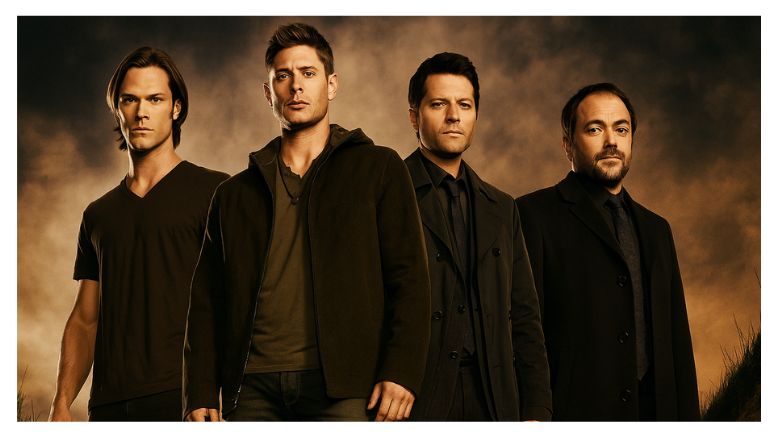Supernatural isn’t just a television show; for many of us, it became an emotional lifeline, a philosophical playground, and an unexpected meditation on what it means to be human. It may have started as a road-trip horror series that ran for 15 seasons about two brothers hunting monsters, but what it truly evolved into was an exploration of love, identity, grief, morality, and resilience.
Supernatural shaped the way many of us understand the self, the unknown, and the ties that bind — often reflecting themes I’ve explored in my blog posts on Monsters, Religion, Multiple Personality, Clairvoyance, and even Psychological Thriller.
Family Beyond Blood
At the heart of Supernatural lies family — messy, painful, and fiercely loyal. Sam and Dean Winchester aren’t just brothers by blood; they’re bound by shared trauma, sacrifice, and choices made in impossible situations. Watching them over the years reminded me that familial love isn’t always soft or kind; sometimes it’s about choosing someone even when it hurts. Whether it’s Dean selling his soul to save Sam, or Sam walking into hell for his brother, the show constantly asks: What would you do for the people you love? And more importantly, can you still love them when they break your heart?
The Tug-of-War Between Free Will and Fate
Supernatural’s myth arcs often pitted the Winchesters against fate — divine plans, prophecies, and apocalyptic destinies that tried to script their every move. But one of the show’s most powerful messages was the rejection of that script. Dean and Sam didn’t always make the right choices, but they made their own. In a world that often feels predetermined or socially restricted, this is a radical affirmation of personal agency.
Supernatural reminds us that we’re more than pawns on a cosmic chessboard. Even when the universe has written you into a tragedy, you still have a say!
God, Faith, and Moral Grey Zones
Supernatural presents a God who is distant, egotistical, and at times, cruel — a controversial take that worked not to mock religion, but to question blind faith. Angels are often bureaucratic or self-righteous, demons are occasionally sympathetic, and humans? We’re messy and complex.
What struck me most was the way Supernatural portrays morality, not in black and white, but in shades of grey. Every character, even beloved ones like Castiel, the Angel or Crowley, King of Hell, blurs the lines between good and evil. The takeaway? Righteousness isn’t always about divine alignment; it’s about intent, accountability, and empathy.
The Real Monsters Aren’t Always Supernatural
Yes, there were literal monsters — werewolves, shapeshifters, ghouls. But often, the show used these creatures to reflect our darkest selves. Episodes like “Bloodlines,” “Benders,” or “Heart” explored themes of alienation, identity, and choice. Some monsters longed for a normal life; some humans became monsters through cruelty or vengeance. That hit home. Supernatural suggested that monstrosity isn’t what you are, it’s what you do; a reminder that our demons are often metaphorical.

Death, Grief, and the Burden of Survival
Few shows confront death like Supernatural. Characters die often — sometimes dramatically, sometimes suddenly — and many return. But this isn’t just plot convenience. The series is deeply interested in the psychological weight of loss. Dean’s cynicism, Sam’s guilt, and Castiel’s quiet sorrow all show the layers of grief.
Supernatural doesn’t offer tidy resolutions. Instead, it validates that surviving trauma is itself a complex, painful, and meaningful process. I appreciated the rawness with which the show portrays survival. Sometimes, living is the harder choice. And sometimes, survival doesn’t mean healing; it just means moving forward anyway.
Addiction, Identity, and Inner Darkness
Sam’s struggle with demon blood addiction and Dean’s self-destructive tendencies both highlight something rarely addressed in supernatural dramas: the fear of becoming your worst self. Their inner battles mirror very real human experiences — addiction, rage, depression, guilt. Watching them try (and sometimes fail) to stay whole reminded me of my inner conflicts. Supernatural didn’t glamorise suffering; it acknowledged how hard it is to remain human when everything inside you wants to give up.
The Power of Chosen Family in Supernatural
Over time, the Winchester circle grew — Castiel, Bobby, Charlie, Jack, even Crowley — all became integral. The idea that family is chosen, not just given, was a recurring lesson. These characters, who were flawed and broken, chose each other again and again. That choice is powerful. It tells viewers that we’re never truly alone, no matter how monstrous we feel. Supernatural reminds us that kinship is not bound by blood but by intent and compassion.
Resilience in the Face of Cosmic Absurdity
Supernatural leaned into the absurd at times — meta episodes, time loops, talking teddy bears.
But even in its most bizarre moments, it never lost emotional weight. It reminded me that even when life feels ridiculous or meaningless, our response still matters. We can joke, scream, and cry, but we keep going. The Winchesters always did. From the Trickster’s chaotic interventions to Chuck’s godly apathy, absurdity was never senseless; it was a commentary on how we endure even when meaning breaks down.
Supernatural treats absurdity not as a humour but as a coping mechanism for trauma. The resilience shown in these moments speaks to the sort of spiritual survival. It is the refusal to be defeated by cosmic indifference. Whether it’s laughing in the face of death or returning to the fight again and again, Supernatural shows us that perseverance is a kind of rebellion.
Why Supernatural Still Matters
As a long-time fan and deeply reflective viewer, I wanted to share how the web series shaped my understanding of the self, the unknown, and the ties that bind.
Supernatural isn’t perfect. It has flaws—pacing issues, underdeveloped characters, and repeated tropes. But what it got right was the heart. It looked at us, deeply flawed, broken, grieving, and said: Keep going.
It tackled themes that continue to haunt us today: spiritual emptiness, religious corruption, emotional vulnerability, moral complexity, death, and love. Supernatural created a world where the sacred and profane were constantly in dialogue, and where monsters were often metaphors for political or psychological realities.
This is why it still resonates. In an age of increasing alienation, disillusionment, and noise, the simplicity of two brothers driving down an empty highway, armed with a shotgun and a sense of duty, offers something timeless. It gives us space to ask: What do we fight for? Who do we love? What makes us human?
So if you’ve ever felt haunted by your past, unsure of your place in the world, or just in need of a reason to keep going, Supernatural might be the mirror you didn’t know you needed. Beneath the monsters and mythology, it’s a story about us.
And in a world full of darkness, that’s the kind of light I keep coming back to. Supernatural doesn’t promise to save us. But it does promise that we don’t have to face it alone.

